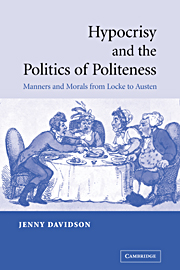Book contents
- Frontmatter
- Contents
- Acknowledgments
- Introduction: The revolution in manners in eighteenth-century prose
- 1 Hypocrisy and the servant problem
- 2 Gallantry, adultery and the principles of politeness
- 3 Revolutions in female manners
- 4 Hypocrisy and the novel I: Pamela, or Virtue Rewarded
- 5 Hypocrisy and the novel II: a modest question about Mansfield Park
- Coda: Politeness and its costs
- Notes
- Bibliography
- Index
2 - Gallantry, adultery and the principles of politeness
Published online by Cambridge University Press: 22 September 2009
- Frontmatter
- Contents
- Acknowledgments
- Introduction: The revolution in manners in eighteenth-century prose
- 1 Hypocrisy and the servant problem
- 2 Gallantry, adultery and the principles of politeness
- 3 Revolutions in female manners
- 4 Hypocrisy and the novel I: Pamela, or Virtue Rewarded
- 5 Hypocrisy and the novel II: a modest question about Mansfield Park
- Coda: Politeness and its costs
- Notes
- Bibliography
- Index
Summary
Those who favor manners often prefer not to admit that the word politeness itself may be found controversial. Politeness can be synonymous with civility, tact or decorum, all terms whose valence is generally positive. But mid-eighteenth-century British writing lacks a consensus on politeness. When supporters of politeness use the word civility, for instance, their opponents are quick to redefine civility as hypocrisy and to condemn it on moral grounds. The word politeness proves equally vulnerable to the process of hostile redefinition. An easy way to refute an argument for politeness is to argue that politeness is a euphemism for something more insidious: politeness means tact, and tact equals lying; politeness means gallantry, and gallantry equals adultery. The anxieties that permeate mid-eighteenth-century Britain's conversations about politeness coalesce around the question of whether a polite education is equivalent to enshrining hypocrisy, as some adversaries charge, or whether politeness can be protected from contamination by its close analogue dissimulation. Where Swift, Mandeville and Locke associated civility's most obvious problems with the question of whether it should be extended to all social classes (particularly the class of servants), however, writers over the decades that followed would come increasingly to believe that gender posed far more pressing questions than class for the ethos of politeness. The writers of mid-eighteenth-century Britain ask a series of questions about women, politeness and insincerity. Can politeness safely be extended to women as a group, or do women simply facilitate and/or benefit from the advancement of masculine politeness?
- Type
- Chapter
- Information
- Hypocrisy and the Politics of PolitenessManners and Morals from Locke to Austen, pp. 46 - 75Publisher: Cambridge University PressPrint publication year: 2004

